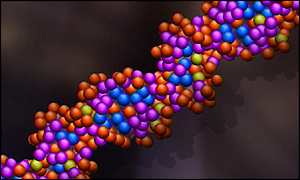
'Ethnic divide' over gene research
URL: http://news.bbc.co.uk/hi/english/sci/tech/newsid_1197000/1197970.stm
Date accessed: 16 March 2001
Friday, 2 March, 2001, 09:38 GMT
Women and people from an Asian background were more likely to believe that research into human genetics was unethical, the poll found. And older people were more likely to have faith in regulations governing genetic research.
Attitudes vary enormously according to the perceived medical and
safety benefits of the technology
|
|
Baroness Helena Kennedy QC
Human Genetics Commission |
The survey suggested most people supported genetic research for medical purposes.
Nine out of 10 agreed that genetic developments could and should be used to diagnose and develop cures for disease. But about three-quarters of those questioned felt they did not know enough about the controls on biological developments.
And most said they had little or no confidence in the rules which regulate research.
Age gap
One-third were concerned that research on human genetics was akin to tampering with nature, and was unethical. The proportion of women believing this (37%) was greater than among men (28%).
Older people, who tended to have more faith in controls governing research, were more likely to agree that police should be able to collect genetic samples from suspects. Young people were only half as likely as those aged over 65 to support this.
And respondents from a black background tended to be less inclined to trust police with DNA evidence.
Black and Asian people were "significantly" less optimistic that new genetic improvements would bring cures for many diseases, compared with white respondents.
There was also a divided response to the question of whether couples at risk of having a child with a serious genetic disorder should have children of their own.
Big choices
More than half of those aged over 55 said couples in that situation should be discouraged from having children, while only one in 20 of those aged 16-24 agreed with this.
Baroness Helena Kennedy QC, chair of the Human Genetics Commission, said the survey gave an "intriguing insight" into people's hopes and fears about genetic technology.
"Many people are looking forward to what the future might bring but at the same time there are a number of important reservations about the choices we may be faced with," she said.
"Attitudes vary enormously according to the perceived medical and safety benefits of the technology.
"The variations between different groups of people in our society are enlightening and it is important that we and others take careful note of these views."
Categories: 4. Ethical and Social Issues Arising out of Biotechnology, 32. Genome Project and Genomics, 39. General Issues about Research